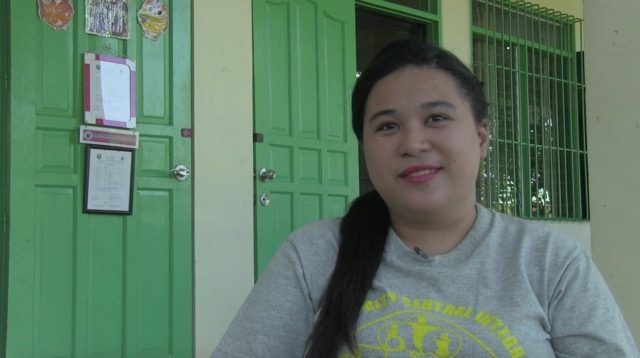SUMMARY
This is AI generated summarization, which may have errors. For context, always refer to the full article.

“Loribeth, kuyugan nimo siya sa ilang balay.” (Loribeth, guide her to your house.)
Teacher July Lasaca asked her student Loribeth Fernandez to take me with her on her way home.
Loribeth, 24, is a person with autism studying senior high school at the Mandaue City SPED High School. I was documenting segments of her day as part of my grant story on education for persons with disabilities. (READ: Cavite, Cebu schools prepare PWDs for employment)
Having no significant interaction with people with a similar condition before, I was kind of anxious to let her direct our way to their home. Her father had gone ahead of us because he had to attend to something. I guess I had no choice but to go on this sort of adventure.
We were told to walk to a nearby Jollibee branch, where we would ride a jeep going to their home. Loribeth’s father, Lorenzo, said their house was just around the corner, so I was expecting a brief trip.
We walked out of the school grounds and headed toward Jollibee. “That must not be too far from here,” I thought.
We had been walking for some 5 minutes, however, and there was still no Jollibee in sight. Did Loribeth really know where we were going?
I reminded her, “Loribeth, Jollibee?”
“Yes, Jollibee,” she responded in her usual high-pitched and happy voice.
A few blocks more and we reached Jollibee shortly after.
We had to cross the road to reach the terminal. I have never really been a skillful pedestrian but I felt I had to lead the way. Loribeth didn’t need any guidance, however, and instead, she helped me cross the busy road.
“Sa balay mo (To your house)?” I asked again, pointing to the jeeps. At that point, I was a bit worried if we would be riding the right vehicle since there were varying signs posted on their windshields.
“Balay mo (Your house)?” she responded. I thought she didn’t understand what I was trying to ask.
Our conversation was limited to these short phrases because she only understands Cebuano and English. Good thing balay (house) was among the Cebuano words I know aside from maayong buntag (good morning) and duwa (two).
And so we rode a jeep. “Duwa,” I told the driver as I handed out our fare.
Again recalling what Loribeth’s father said, I did not expect the ride to be that long. So I relaxed and let Loribeth prompt the driver when to stop. But some 15 minutes and several right turns later, I asked her again.
“Loribeth, malapit na (Loribeth, are we near)?”
She did not respond. I think she was puzzled with what I just said.
So I just let it be – until 10 minutes later and we still hadn’t reached our destination. I was more worried when I caught her catching a nap, seemingly tired from a day’s work at school.
When she woke up, I asked her, this time in English: “Loribeth, we are going to your house. Are we almost there?”
She then pointed toward where the jeep is heading. I was still clueless if we were near or not. But just a few minutes later, she told the driver, “Stop.”
We walked a few more meters until we reached their house. Finally, I saw her father – the sign that finally, we had arrived at their home.
“Kaya po pala talaga ni Loribeth bumiyahe mag-isa ‘no, sir (Loribeth can really travel alone, right, sir)?” I told him.
“Oo, ma’am. Kaya niya talaga mag-isa (Yes, ma’am. She really can do it alone),” he replied, also explaining to me that the trip took a while because the jeep took a longer route than usual.
I would be stating the obvious if I said I had so many doubts during our whole escapade. But I was happy and more humbled that I was proven wrong.
There remains many misconceptions and false judgments about persons with autism. They are called derogatory terms such as being retarded, discriminated against in the community, and face problems in getting jobs.
If more people would get to interact with them like this, maybe more would see that persons with autism have the capabilities and skills to lead normal lives just like everyone else.
– Rappler.com
Add a comment
How does this make you feel?





There are no comments yet. Add your comment to start the conversation.